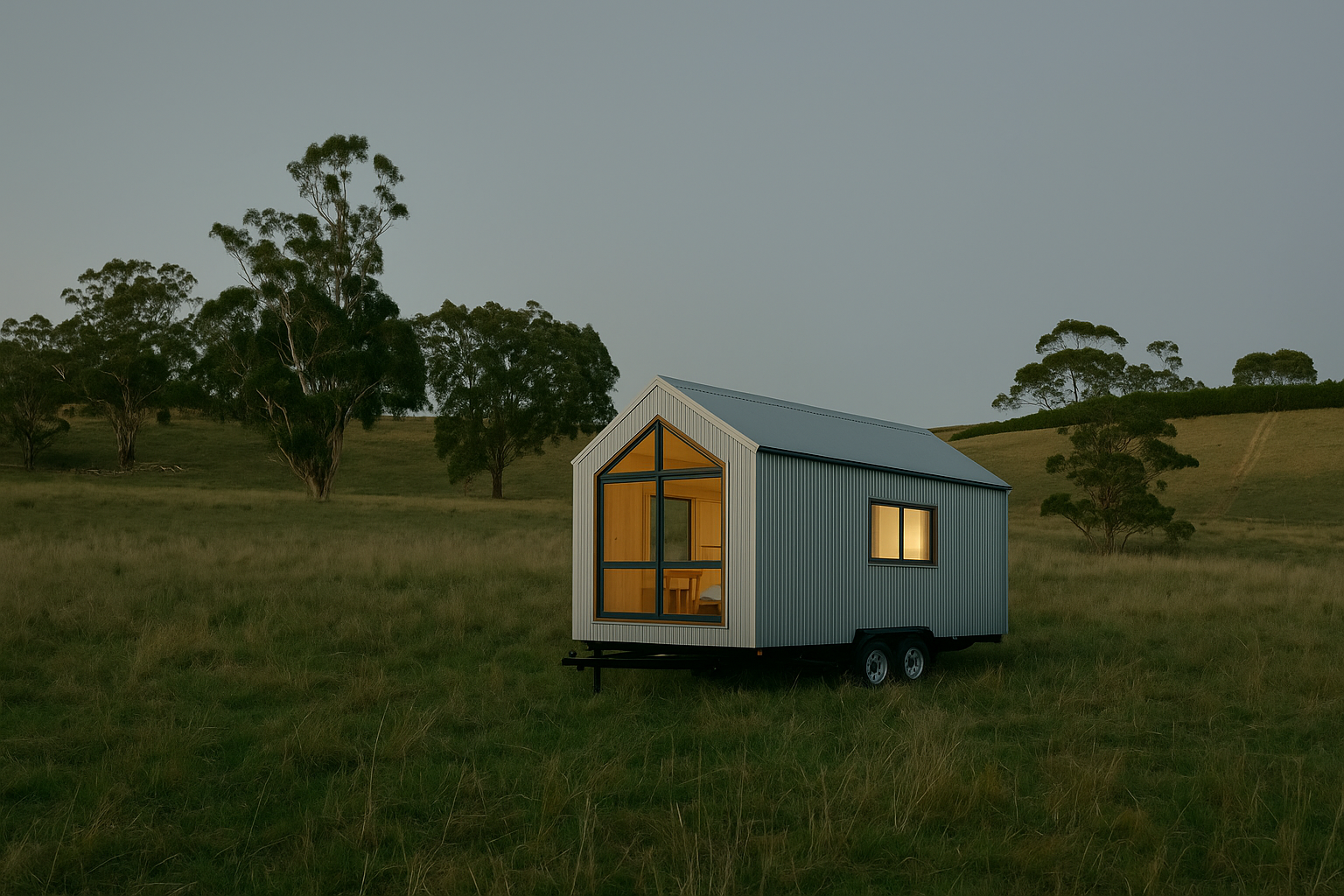
14th of June 2025 | By Sarah Johnstone
Tiny homes are gaining serious momentum across New South Wales, offering a flexible and affordable housing solution like no other. Whether you’re embracing tiny homes for a long-term lifestyle change, a temporary housing solution, or an investment to unlock rental income from your property, it is important to understand tiny home legalities to make them work for you.
This guide breaks down NSW State Legislation relating to Tiny Homes on Wheels in 2025, including; if you can live in them, when council approval is needed and what exemptions apply + you’ll get our free NSW Tiny Home Compliance Checklist.
In NSW, a Tiny Home on Wheels is typically classified as a caravan, campervan, or moveable dwelling. This classification exists because Tiny Homes on Wheels are built on road-registrable trailers, not on permanent foundations like traditional homes or granny flats, their mobility makes them structurally and legally different.
The key difference between a Tiny Home on Wheels and a fixed dwelling is that Tiny Homes on Wheels are designed to be relocatable.


As a result, Tiny Homes on Wheels are treated more like vehicles than buildings under NSW law, which places them in a separate legal category and exempts them from many building and planning approval requirements that apply to fixed dwellings.
Local Government (Manufactured Home Estates, Caravan Parks, Camping Grounds and Moveable Dwellings) Regulation 2021: Governs how, when and where Tiny Homes on Wheels can be legally used in NSW.
Road Transport (Vehicle Registration) Regulation 2017: Governs the registration and legal classification of vehicles in NSW. If a tiny home is built on a trailer and intended to be classified as a trailer/ caravan it must be registered with TfNSW.
Development Approval (DA): Generally, you do not need a DA approval for a Tiny Home on Wheels as it is usually classified as a caravan. It will typically fall under Complying or Exempt Development which will usually require a CDC (Complying Development Certificate), Council Planning Permit or no planning approvals.
Construction Approval (CC): You don’t need a CC (Construction Certificate) for a Tiny Home on Wheels as this would require it complies with the Building Code of Australia (BCA) – National Construction Code (NCC) which is not applicable to a Tiny Home on Wheels as they are moveable dwellings, not permanent structures. The NCC applies only to fixed buildings.
Zoning Restrictions: Because a Tiny Home on Wheels can be classified as a vehicle or moveable dwelling (not a permanent structure), they’re often exempt from zoning rules that apply to traditional homes and granny flats such as – minimum lot sizes, dual occupancy restrictions, or housing density limits.
The Local Government (Manufactured Home Estates, Caravan Parks, Camping Grounds, and Moveable Dwellings) Regulation 2021 states the exemptions for council approval, as noted below:
77 ‘Installations for which approval not required’
(1) The approval of the council is not required for the installation of the following-
(b) 1 caravan on land occupied by the owner of the caravan in connection with the owner’s dwelling house if the caravan is-
(i) used for habitation only by the owner or members of the owner’s household, and
(ii) maintained in a safe and healthy condition
Therefore: You can have one Tiny Home on Wheels on a property with someone occupying it full-time without council approval if;
In NSW, you typically will need council approval or other planning permissions if your tiny home doesn’t meet the exemption conditions under Clause 77 of the Local Government Regulation 2021 (noted above).
While DA (Development Application) Approval typically does not apply to a Tiny Home on Wheels due to their moveable nature (DA approval applies primarily to fixed, permanent structures), other lesser forms of development approval are often required.
A Tiny Home on Wheels will typically fall under Complying or Exempt Development and will therefore require either a CDC (Complying Development Certificate), Council Planning Permit or some other form of minor council approval.
To find out what approvals apply to your circumstances specifically, contact your local council or planning consultant.
Once your Tiny Home on Wheels is installed on the property and you are living in it or leasing it out, it must be maintained in a safe & healthy condition.
Yes you can rent out a Tiny Home on Wheels in NSW. If the tiny home is safe, well-maintained, and set up on land with an existing dwelling, it may be suitable for use as a secondary dwelling. Many landowners use tiny homes as a way to accommodate family and friends, or generate rental income through long-term tenants.
If you are planning on adding a Tiny Home on Wheels to your property to rent it out long-term it is essential that you contact your local council first about any approvals that may be required.
Contact your Local Council and/ or Planning Consultants to identify local planning laws that apply to you.
Make sure you don’t miss any legal or safety steps, grab our free NSW Tiny Home Compliance Checklist. It covers Tiny Home Registration, State Planning Laws and Health & Safety Standards.
Disclaimer: This is general information only and not legal advice. Please check with your local council for rules specific to your area.
You must be logged in to submit this request
You must be logged in to submit this request.
You must be logged in to submit this request
You must be logged in to submit this request.